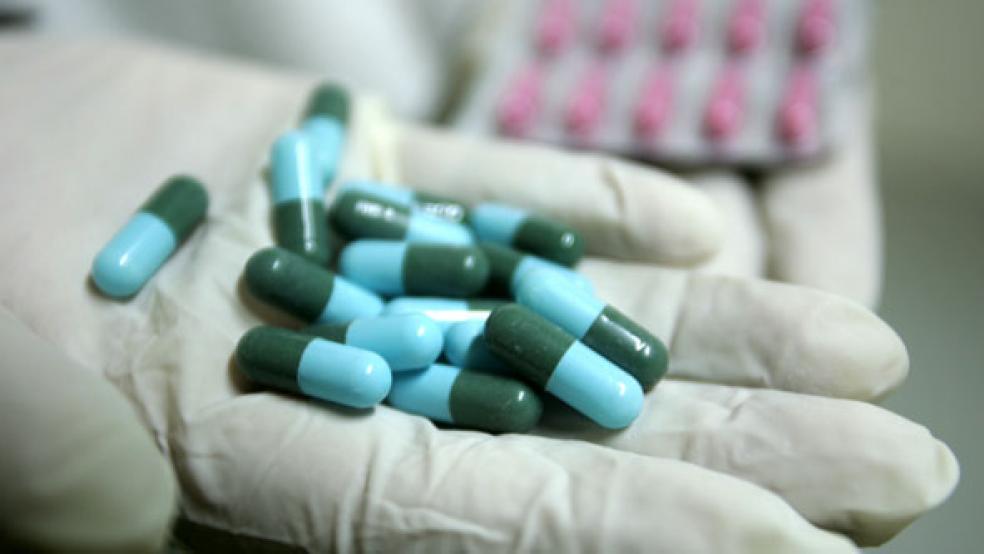The outcry continues over a $1,000 pill used to treat Hepatitis C made by California-based Gilead Sciences.
While the drug is a significant advance over older treatments for the viral liver disease, the price set by the company “represents an abuse of market power,” said John Rother, president and CEO of the National Coalition on Health Care, which includes businesses, unions, insurers, consumers and some drugmakers, including the Generic Pharmaceutical Association.
On Wednesday, the group urged a “national dialogue” on the cost, saying Sovaldi’s price tag threatens the budgets of government run-health programs as well as the premiums for everyone who has private insurance.
Related: How Hepatitis C Would Wallop the U.S. in the Next Decades
With more such “specialty drugs” in the pipeline for other conditions that affect millions of people, the group says the drug industry must find “a more sustainable approach” on prices for new products – although it stopped short of giving examples of how that might be done.
The U.S. currently spends more than $300 billion on pharmaceuticals each year. Simply covering the cost of Sovaldi for the more than 3 million Americans who are estimated to have hepatitis C could double that.
Gilead has staunchly defended Sovaldi’s price, saying the cost – at least $84,000 for a typical patient – is justified because the drug is curative for many and could slow health spending on costly complications of hepatitis over time.
“Sovaldi … represents a finite cure, an important point to consider when comparing the price of a pill or bottle to the lifetime costs of treating a chronic disease,” said spokeswoman Cara Miller. Paying for the new drug will fall on private insurers, and taxpayers through government programs such as Medicaid and Medicare, and could also lead to higher premiums.
All insurers are currently setting guidelines for the use of Sovaldi and another new costly hepatitis C drug called Olysio. While some are making it broadly available, others are saying some patients with mild liver damage should wait for treatment. More hepatitis C drugs are expected on the market as early as this fall – and, unlike Sovaldi, may not require the use of additional drugs that add costs as well as difficult side effects.
The drug industry has long noted that prices reflect the cost of researching and developing drugs. The industry is on the offense, with its lobbying arm saying in a blog post Wednesdaythat prescription drugs account for only 9 cents of every dollar spent on health care. The Pharmaceutical Research and Manufacturers Association of America is also circulating chartsthis week touting advances in cancer treatments – and noting that the average sales price of cancer drugs covered by Medicare has not risen faster than medical inflation.
If all drugmakers were to justify high prices by saying their products could reduce costs over time by preventing complications, “it could bankrupt the system,” said Rother.
Rother says that officials from Gilead have talked with his group, but so far only in a “defensive” posture over the price. Instead, he wants them to “engage” in conversations about ways to lower the drug’s price.
The coalition joins others – notably pharmacy manager Express Scripts – in calling for a “national dialogue” on drug pricing, although it could not point to an example where that has lowered drug prices in the past.
Prices for drugs in the U.S. are generally what the market will bear – and the market is snapping up Sovaldi even at its high price. In first quarter earnings, Gilead said the drug brought in $2.1 billion in revenue.
“This is an issue other countries have solved,” said Debra Whitman, executive vice president of policy at AARP and a board member of the coalition. She noted that Sovaldi costs $66,000 per 12-week treatment in Germany and $57,000 in Great Britain.
Among the differences in those countries is that regulators are far more involved in approving drugs for use in national health plans – and negotiating how much is paid for them. In England, for example, the cost as well as the effectiveness of drugs is part of the evaluation about whether to approve them for use in the national plan.
Rother said the coalition is not calling for price controls and doesn’t think Congress should get involved. “They don’t need to have a direct role,” said Rother. But, he cautioned, if negotiations with drugmakers fail, the industry will ultimately find itself facing lawmakers. “The hope is we can resolve this quickly and through the private sector,” he said.
This article originally appeared in Kaiser Health News.




